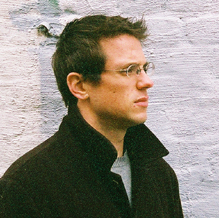 Friday, June 10, 2005
Friday, June 10, 2005
Edge Fest review
I'm back online after a great show at the Berkeley Edge Festival and a successful house-hunting trip to Tucson. There were two concerts last sunday as part of the Edge Fest--one featuring the music of John Zorn (Masada Book Two - The Book of Angels for violin and piano and Necronomicon for string quartet) and another featuring music by Berkeley and Berkeley-affiliated composers. Zorn's music is intense, visceral, satirical, and extremely communicative but over the course of an entire concert, not to mention an entire weekend, becomes very predictable, losing music of its shock value and humor once you've heard a cartoon or standard classical music quote more than twenty times. That being said, the players (Mark Feldman, violin and Sylvie Courvoisier, piano, along with the Crowley Quartet) were absolutely viscious, which made the concert more than bearable even after you knew what was coming.
I played on the Berkeley composers concert, which featured the music of Jorge Liderman, Fernando Benadon, Reynold Tharp, Adriana Verdie Vas-Romero, and Keeril Makan. We had a wonderful and responsive crowd for the event. However, Keeril and I didn't get the rave review we were hoping for. Here's what Jonathan Russell of the San Francisco Classical Voice wrote about us:Keeril Makan?s Voice within Voice for solo baritone saxophone, performed by Brian Sacawa, is not really a composition but a catalog of the cool sounds you can get from using your voice in a baritone saxophone in different ways. And yes, some of these sounds are awfully cool. But I hope that Makan will now go back and actually do something with these sounds. Perhaps in the ?50s and ?60s it was enough simply to experiment and find out all the sounds you can get out of an instrument; but that?s all been done now. What?s really interesting now is what a composer can do with these discoveries. I also found myself irritated by the seriousness with which this whole enterprise seemed to be taken. Some of these sounds are just really silly sounding and I wanted to laugh, but the vibe of the performer and the audience was clearly not to laugh but to take this all very seriously. Quite a contrast to the vibe at the John Zorn concert earlier that day.(Read the entire article here.) There are a lot of cool sounds in the piece and I think Mr. Russell simply wasn't able to get past this aspect of the work when forming his opinion of the piece. Much of the work sounds nothing like a saxophone. And I'm sure much of the audience experienced a bit of a shock when I walked out--they expected to hear one thing but instead heard something very different. We received several comments from audience members that the piece sounded less like an acoustic instrument and more like an electronic composition. Keeril creates a complex sound with the instrument that is a combination (in various permutations throughout the piece) of teeth on the reed, breath, sung tones (inhaling and exhaling), and actual played pitches. Sometimes all four of these aspects sound simutaneously, making a very intricate composite sound. Because Mr. Russell appeared to not be able to get past Keeril's unique sound universe, he missed his masterful command of development and pacing and control of a very personal "catalog of sounds." But that's just my biased opinion (and I consider this piece to be an example of one that requires more than one hearing to grasp firmly) and the piece will be on the American Voices CD so you can decide for yourself if you believe me or if I'm full of it!
posted by Brian Sacawa
12:01 AM
|
|
 Praised by The New York Times as "an inventive musician . . . fresh and surprising," saxophonist Brian Sacawa has firmly established himself as an important contemporary voice for his instrument. He is active as a soloist, recitalist, and chamber musician throughout the United States and is the co-founder of the new music duo Non-Zero with percussionist Timothy Feeney.
Praised by The New York Times as "an inventive musician . . . fresh and surprising," saxophonist Brian Sacawa has firmly established himself as an important contemporary voice for his instrument. He is active as a soloist, recitalist, and chamber musician throughout the United States and is the co-founder of the new music duo Non-Zero with percussionist Timothy Feeney.
He has given premieres of over thirty works by both established and emerging composers, including Michael Gordon, Bright Sheng, Andrew Mead, Oliver Schneller, Ken Ueno, Beata Moon, Hillary Zipper, and Scott McAllister, among many others. Named the Baltimore CITYPAPER’s Critic’s Choice for Classical Music in 2002, he is the recipient of awards for solo performance from both national and international competitions.
Sacawa's versatile career has led to appearances with the St. Petersburg Philharmonic, the Detroit Symphony Orchestra, the New World Symphony, Harvard Group for New Music, New Music Brandeis, Bargemusic, and at meetings of the ISU Contemporary Music Festival, World Saxophone Congress, North American Saxophone Alliance, and New England Saxophone Symposium.
Brian holds degrees from the University of Michigan, the Peabody Conservatory, and the University of Massachusetts – Amherst, where he studied with Donald Sinta, Gary Louie, and Lynn Klock. He has recorded for the Equililbrium, Naxos, and BiBimBop recording labels.
See Brian's other blog
Sounds Like Now
| |



